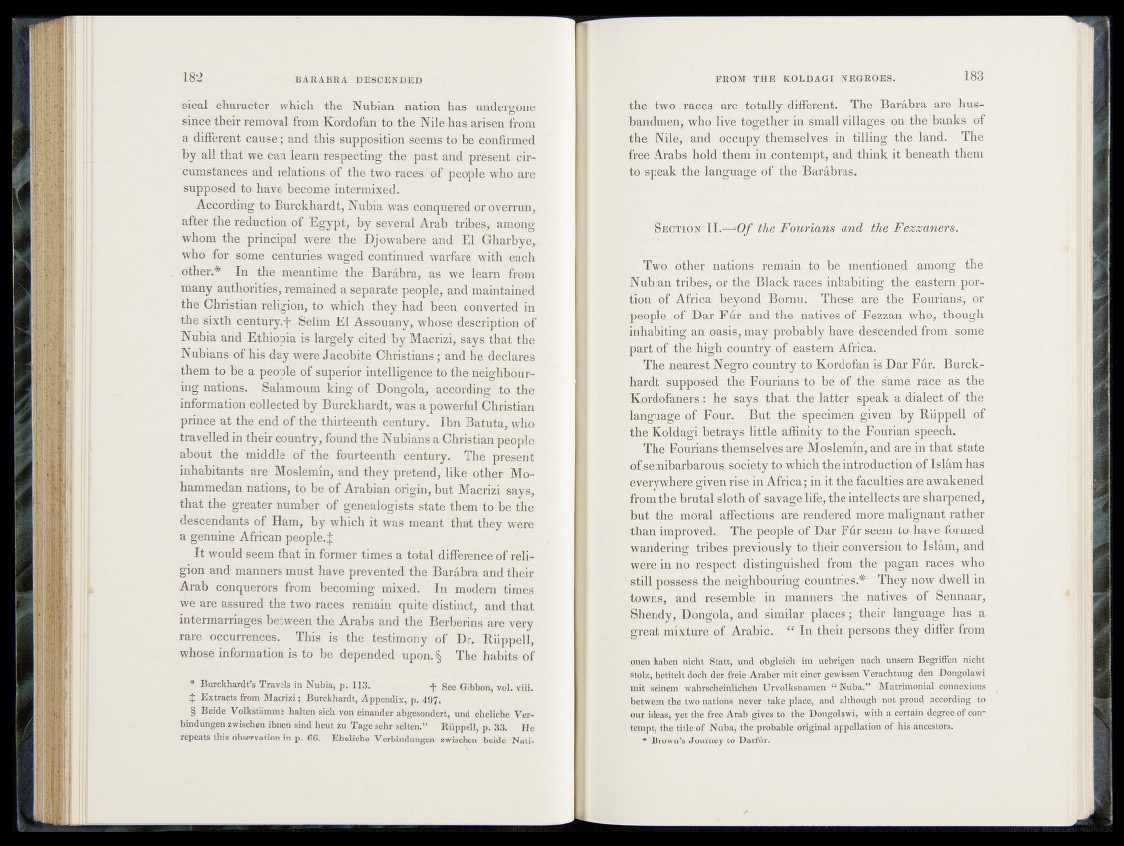
sical character which the Nubian nation has undergone
since their removal from Kordofan to the Nile has Arisen from
a different cause.; and this supposition seems to be confirmed
by all that we can learn respecting the past and present circumstances
and relations of the two races of people who are
supposed to have become intermixed.
According^ to Burckhardt, Nubia was conquered or overrun,
after the reduction of Egypt, by several Arab tribes, among
whom the principal were the Djowabere and El Gbarbye,.
who for some centuries waged continued warfare with each
other.* In the meantime the Barabra, as we learn from
many authorities, remained a separate people, and maintained
the Christian religion, to which they had been converted in
the sixtlTcentury.-f Selim El Assouany, whose description of
Nubia and Ethiopia is largely cited by Macrizi, says that the
Nubians of his day were Jacobite Christians ; and he declares
them to be a people of superior intelligence to the neighbouring
nations. Salamoum king of Dongola, aceording ..to the
information collected by Burckhardt, was a powerful Christian
prince at the end of the thirteenth century. Ibn Batuta, who
travelled in their country, found the Nubians a Christian people
about the middle of the fourteenth century. The present
inhabitants are Moslemln, and they pretend, like other Mae
hammedan nations, to be of Arabian origin, but Macrizi says>
that the greater number of genealogists state them to be the
descendants of Ham, by which it was meant that,they were
a genuine African people.£
It would seem that in former times a total difference of religion
and manners must have prevented the Barabra and their
Arab conquerors from becoming mixed. In modem times
we are assured the two races remain quite distinct, and that
intermarriages between the Arabs and the Berberins are very
rare occurrences. This is the testimony of Dr. Riippell,
whose information is to be depended upon. § The habits of
* Burckhardt’s Travels in Nubia, p. 113. + See Gibbon, vol. viii.
t Extracts from Macrizi; Burckhardt, Appendix, p. 497.
§ Beide Volkstamme halten sich von einander abgesondert, und eheliche Ver-
bindungen zwischen ibnen sind heut zu Tage sehr selten.” RuppeU, p. 33. He
repeats this observation in p. 66. Eheliche Verbindungen zwischen beide Nati.
the two, races are totally different. The Barabra are husbandmen,
who live';together in small villages ton the banks of
the Nile, and' occupy themselvfes in tilling the land. The
free Arabs hold them in contempt, and think it beneath them
to speak the language of the Barabras.
Section II.—•Of the Fourians and the Fexzaners.
Two other nations, remain to he mentioned among the
^Nubian tribes, or the Black races inhabiting the eastern portion
of Africa., beyond Bomu. These' are The Fourians, or
people ;of Dar Fur and The natives of Ee^zan who, though
inhabiting an oasis, may. probably have d^cem^d from some
part of the 'high- country of eastern Africa. .
The nearest Negro, country to Kordofan is Dar Fur. Burek-
hardt supposed the Fourians to be of the^isame xace as the
Kordofaners : he says that the latter speak a dialect; of the
language of Four. But the specimen given by Riippell of
the Koldagi betrays little affinity to the Fourian speech.
The Fourians themselves are Moslemln, and are in that state
of gemibarbarous, society to which the introduction of Islam has
everywhere given rise in Africa; in it the faculties are awakened
from the brutal sloth of savage life, the intellects are sharpened,
but the moral affections are rendered more malignant rather
than improved. The people of Dar Ftir seem to have formed
wandering tribes previously to their conversion to Islam, and
were in no respect distinguished from the pagan races who
still possess the neighbouring Countries.* They now dwell in
towns, and resemble in manners the natives of Sennaar,
Shendy, Dongola, and similar places; their language has a
great mixture of Arabic. “ In their persons they differ from
onen haben nicht Statt, und obgleich im uebrigen nach unsem Begriffen nicht
stolz, betitelt doch der freie Araber mit einer gewissen Verachtung den Dongolawi
mit seinem wahrscheinlichen Urvolksnamen “ Nüba.” Matrimonial connexions
between the two nations never take place, and although not proud according to
our ideas, yet the free Arab gives to the Dongolawi, with a certain dogreeof contempt,
the title of Nuba, the probable original appellation of his ancestors.
* Brown’s Journey to Darfür.